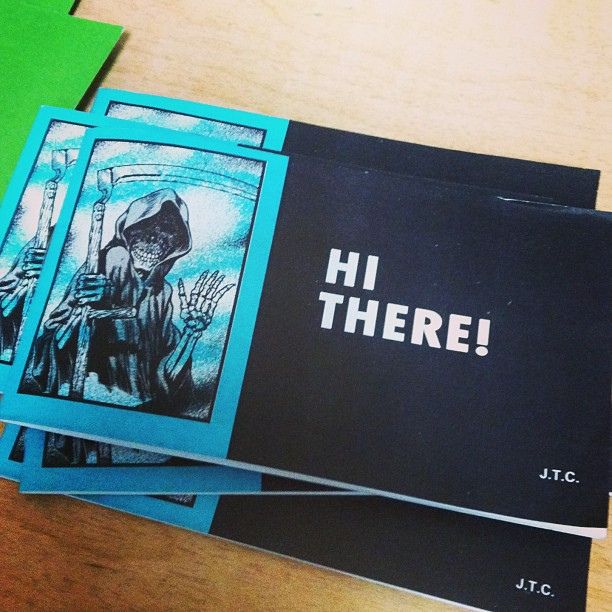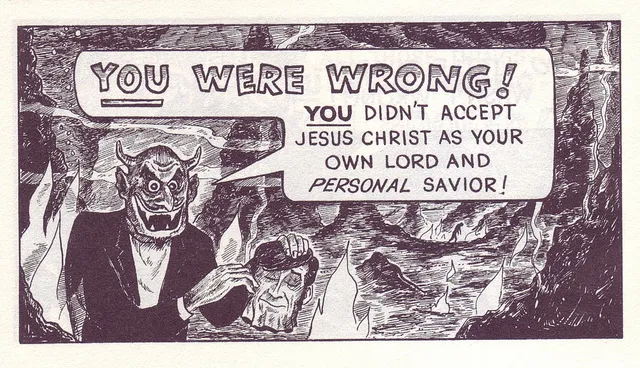Five Things to Know About Evangelical Cartoonist Jack Chick
The controversial artist died after 50 years of publishing comics
:focal(319x179:320x180)/https://tf-cmsv2-smithsonianmag-media.s3.amazonaws.com/filer/df/09/df09e37e-f245-437f-b76c-174cb836bddf/60640372_bd1fb82969_z.jpg)
There’s nothing quite like a Jack Chick comic. For decades, the reclusive evangelical Christian artist published pocket-sized tracts that railed against everything he thought led to evil and sin, from the Catholic church and ethnic minorities to video games. Though he was accused of using his platform to promote hate speech, many people (artists and collectors alike) found his work oddly compelling. After more than 50 years of putting out minicomics, Chick’s publishing company has announced that its founder died at the age of 92 on Sunday.
Here are five things to know about Jack Chick and his comics:
Who was Jack Chick?
Chick wasn’t always a firebrand evangelical. Born in Los Angeles in 1924, Chick was a sickly child with a penchant for theater: he studied at the now-closed Pasadena Playhouse School of Theater, where later greats like Dustin Hoffman and Gene Hackman got their start, and continued to perform after he returned from serving in the army during World War II, Robert Ito reports for Los Angeles Magazine. However, once he met and married his first wife, an evangelical Christian named Lola Lynn, whose family had him to listen to "Charles E. Fuller’s Old-Fashioned Revival Hour" radio show, Chick became a fervently outspoken crusader of fundamentalist Christianity.

Just what is a Chick Tract?
The tiny comic books that Chick has published since 1961 are somewhat similar to zines. They’re small, usually printed in black-and-white or with a tiny splash of color, and are made up of manifestos and declarations hoping to sway the reader to his point of view. The covers are often simple, typically with a single, small drawing on the front alongside innocent-seeming titles like “This Was Your Life,” “Somebody Loves Me,” and “Charlie’s Ants.” However, peeking inside invariably leads down a rabbit hole as Chick attempts to scare the sin straight out of his readers, promising hellfire and eternal damnation if they didn’t turn away from worldly evils and embrace a fundamentalist reading of Christianity.
Whom did he target?
It’s almost easier to list off institutions and subjects that Chick didn’t think were casting people’s souls into the fires of hell. During his decades-long career, Chick wrote comic screeds decrying the moral decay brought on by the Catholic church, Judaism, Islam, gay people and the Masons, to name a few. But he also targeted pop culture: Chick hated Halloween and was convinced that Dungeons and Dragons was designed to indoctrinate young people into literally selling their souls to Satan. More recent comics targeted things like the Harry Potter books, The Walking Dead and anime. In many cases, though, the core of his beliefs tended to revolve around the feeling that a vast web of conspiracies helmed by the Devil were laid throughout the world in an attempt to sway people’s hearts away from the teachings of Jesus Christ.

What makes his comics so compelling?
Chick’s blunt language and iconic, pulpy drawing style are immediately recognizable for anyone who has stumbled on Chick Tracts left behind in places like buses and public bathrooms. The minicomics are often packed with the most shocking images and gory scenes leading up to a promise of either eternal damnation or repent and salvation. While his comics are full of anger and hate, for some people that unabashedness and shocking imagery is akin to what they might find in a gore-spattered grindhouse horror flick, and his books have been exhibited at places like the Smithsonian and inspired fellow cartoonists like Daniel Clowes and Robert Crumb.
Is this the end of Chick’s comics?
According to a statement by Chick Publications, the small publishing company he started in the 1960s, they have no intention of quitting the tract business. With hundreds of minicomics in their library and billions of souls to save, they have proclaimed that “Nothing changes: The Method, The Vision, The Purpose.” It remains to be seen how they will continue without Chick, but his influence seems assured to continue as long as there are Chick’s comics are out there trying to scare people out of sinning.